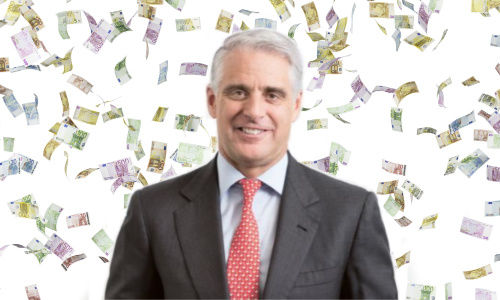Andrea Orcel may come out on top despite the CEO job at Santander slipping through his fingers – at least financially. finews.com looks at the three key questions facing the ex-UBS heavyweight.
Andrea Orcels's resignation as head of UBS' investment bank last year was meant to beckon the crowning achievement of his career. The move ended in tears after Santander four months later backed out of giving the European dealmaker the CEO job.
Instead of beginning the next phase of his C-suite career, Orcel is now mired in a 100 million euro ($112 million) legal battle with the Spanish bank over amends. Meanwhile, he still has roughly $50 million coming from UBS – provided he doesn't go to work for a competitor to the Swiss bank.
Orcel's shattered hopes and legal battle raise three key questions:
1. How Much Dosh Are We Talking About?
The nature and size of Orcel's lawsuit against Santander in a Madrid court are unique. To be sure, most people would arguably do the same – Orcel gave up a good and promising job at UBS for the Santander offer. He now faces the impossible choice between doing nothing, or relinquishing his UBS awards for going back to work.
Santander promised the ex-UBS banker an 17 million euro cash bonus for signing on, and pledged to replace 35 million euros on UBS stock that he would have to leave at the Swiss bank, a source familiar with the situation told finews.com. Beyond these awards, Orcel is suing for five years' salary of 10 million euros annually.
If Orcel wins the damages he is seeking from Santander, will UBS still pony up the staggered awards it holds for him – provided he doesn't violate their terms by joining a competitor? The extreme scenario is that Orcel wins vs Santander in court – dignity and money – and also gets his UBS awards. An $150 million windfall potentially beckons (it is unclear what effect, if any, the lawsuit has on Orcel's «leaver» status from UBS).
2. What Jobs Can Andrea Orcel Accept?
Santander's official explanation for reneging is that it was too expensive to «make whole» Orcel, or replace what was due him from UBS. Whether this represents the truth or not: any other bank looking to snap up the rainmaker will face the exact same problem justifying the expense to its shareholders.
Deutsche Bank, where three departing top executives grabbed 26 million euros as 18,000 jobs were culled, exemplifies this conundrum. None of UBS' battered European rivals can afford Orcel's price-tag.
He stands a better chance at a major U.S. bank: before UBS, Orcel worked for Bank of America Merrill Lynch (where he first met UBS CEO Sergio Ermotti). He recently told the «Financial Times» (behind paywall) that he would forgo the UBS cash and stock he is due, for a more interesting job.
In the U.S., J.P. Morgan boss Jamie Dimon is a role model to bankers for making it from banker-employee to billionaire – albeit in a Wall Street career spanning 37 years. Last year, the American bank lifted the long-standing CEO's pay to $31 million. Even if Dimon is an outlier, major U.S. banks are clearly spendier than their European counterparts.
For Orcel, retreating back to Bank of America or another top-five bank like Citi or Goldman Sachs would be lucrative. Another option, floated by Orcel himself, is to strike out on his own, like the Zaoui brothers, who put their name of huge mandates like Lafarge Holcim's $50 billion tie-up with a tiny advisory firm set up in 2013. In this scenario, Orcel would almost certainly have to relinquish the UBS awards, but could still bet on the Santander millions.
3. Will Andrea Orcel's Non-Compete End in Silicon Valley?
A third, less-discussed option for Orcel is defecting to uncharted territory: the investment banker could surface in Silicon Valley, where he has held talks, «Bloomberg» reported. The report left it up in the air whether Orcel is talking to big tech like Amazon and Facebook, or interested in a coterie of promising financial start-ups gaining traction in the Californian hub.
Orcel wouldn't be the first to trade in: Ruth Porat, the finance boss at Google parent Alphabet, previously oversaw the finances at Morgan Stanley. A dramatic change of scenery would raise questions that UBS would probably prefer not to answer.
If the Swiss bank scotches Orcel's awards for taking a tech job, it would be a tacit admission of that the «Gang of Four» (Google, Amazon, Facebook, Apple) pose a real threat to banking. To be sure, the established big tech firms have the deep pockets to make Orcel whole. Silicon Valley is likely the only place that could make Orcel's UBS $50 million pale in comparison.




































